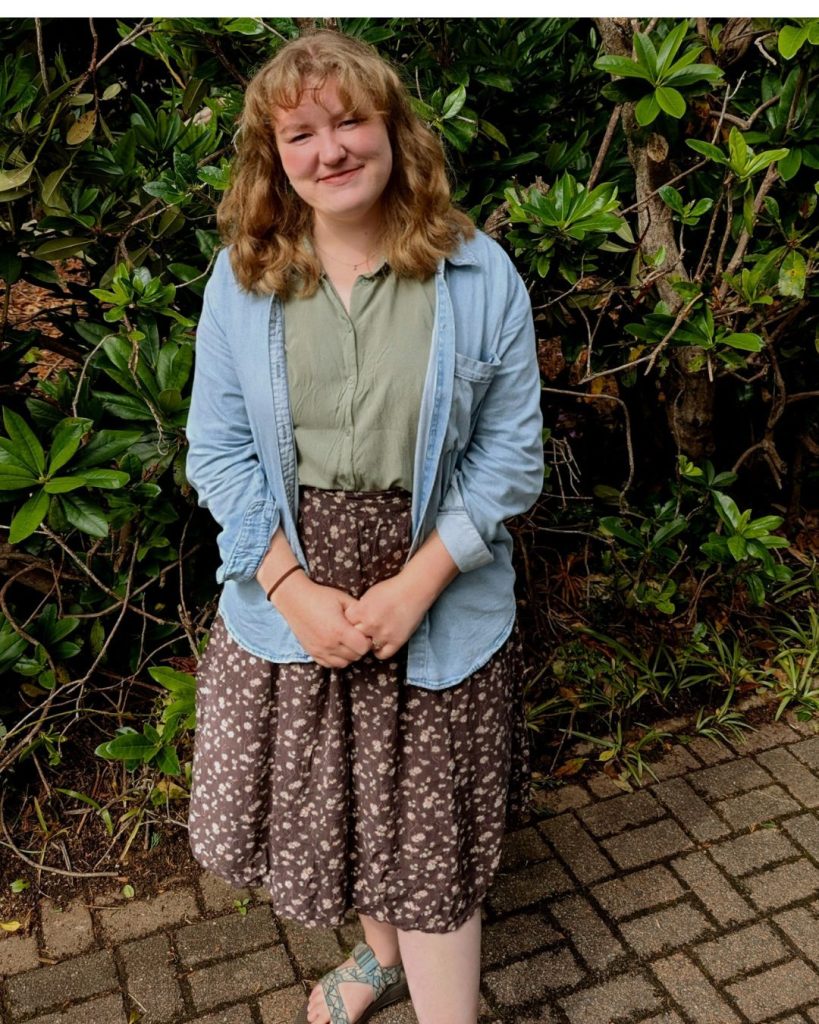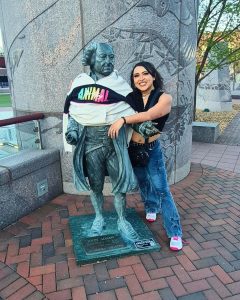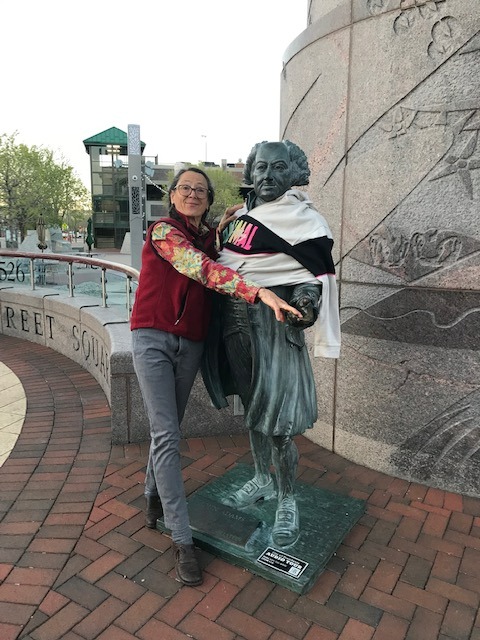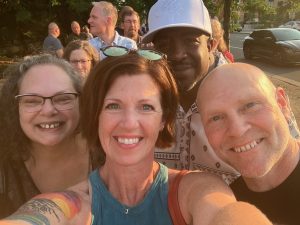WORC’s Principles of Community Organizing helps turn concerned residents into leaders. Here are the stories of some of them.
At Western Organization of Resource Councils, we believe deeply in the power of everyday people coming together to have a say in the decisions that impact their lives. We also believe in their power to strategize, campaign, and manifest the future they want to see for their families and communities. That’s why we created and hold the Principles of Community Organizing training–to support organizers, leaders, and community members in building stronger organizations, running more strategic campaigns, and bringing about a future where rural communities thrive, our institutions reflect the people they are meant to serve, and the people and places we love are safe.
At our last POCO training, in late April, 25 leaders and staff members from throughout the WORC network and region gathered in Rapid City, South Dakota to immerse themselves in the core theories and skills of community organizing. Over the course of three days, and taking part in a variety of hands-on facilitation formats, participants gained experience in how to identify good issues, turn them into campaigns, find and develop leaders, build power for change, and use storytelling to connect people to shared values.
Here are the stories of some of those participants.
Callie Stainbrook, POCO ’25
Callie Stainbrook had just returned to her hometown of Rapid City, South Dakota after finishing up a master’s degree in Glasgow, Scotland when Covid arrived in the U.S. Home alone and working as a tutor online, she felt isolated, and hungry for some kind of connection with people in Rapid City. That’s when she started following Dakota Rural Action’s social media. An acquaintance, Gabbi DeMarce, had started working as a community organizer for DRA, a WORC member group. She encouraged Callie to get involved. She started by helping DRA pressure the city council to find humane solutions for its growing population of unhoused people.
Now a mother and working part time as an art instructor, Callie last year deepened her involvement and joined DRA in conducting a community assessment that will help guide the development of a Rapid City chapter. Gabbi eventually floated the idea of Callie attending POCO, and Callie accepted.
“I wanted to hear about other people’s experiences, hear what movements were happening in other places and have those connections,” Callie says.
“I also wanted to learn more about the overall structure of organizing. I understand relationship building, but I wanted more information on how to use organizing to form a wider movement and really shift the needle.”
At POCO, Callie learned organizing from A to Z, including how to shift the needle.
“You do the one-on-ones. You do the house meetings. You build up this whole group and then you move on an issue,” she says. “I liked how the training was really about letting the people you’re talking to pull up the issues themselves and use their self-interest to move on them.”
Though Callie had already been conducting one-on-ones before attending POCO, the training improved her skills at unearthing and illuminating the issues that mean the most to the people she’s meeting with.
“It’s easy to get people to complain about something that’s happening in the world today, because we all have strong feelings about it. But POCO helped me be able to find out, how does a particular issue impact you and why should that motivate you to do something about it?”
Callie also found POCO’s session on how to run a meeting extremely valuable, including, as she says, “all of the pieces that go into even making sure people show up to a meeting and then making sure that meeting is worth their time. I learned a lot from that session.” Running an effective meeting is something she’s already put to use at another nonprofit she volunteers for that focuses on creating hydroponic gardens in Rapid City.
“In my personal life, POCO built resilience and hope.”
– Callie Stainbrook
Callie continues to serve as a member leader for DRA helping build a Rapid City chapter. What she learned at POCO, on how to build an organization and a movement, are coming into play, from conducting one-on-ones to throwing house parties to choosing an issue to work on.
In all, what Callie took away from POCO was something more than just skills.
“In my personal life, POCO built resilience and hope. When I get in conversations with my family or my friends, when they’re feeling frustrated about the world, just bringing in the self-interest pieces and being like, we really can do things about this, can pull them into a more hopeful space.”
Yaretzi Mosqueda, POCO ‘25
Earlier this year, Yaretzi Mosqueda (who goes by the nickname Zizi) attended the annual meeting of Uncompahgre Valley Alliance (UVA) not knowing what to expect. A chapter of the Western Colorado Alliance, UVA is based in Montrose, where Zizi grew up and now lives.
“I had been searching for a group I could connect with, that provides something for this community I live in,” the 30-year-old says. “They were specific about talking not about what they wanted as individuals, but what the community wanted and needed the most. I found that pretty intriguing.”
One issue UVA works on and that Zizi found most compelling is inner-city public transportation, which does not exist yet within Montrose – a particular problem for disabled people, the elderly, young people, and others who don’t have a car or can’t drive and need to find some way to get to work or attend appointments. It was a particular problem for Zizi before she was able to afford a car.
Finding a sense of belonging at UVA, Zizi became a member and started volunteering for its public transit and regenerative agriculture campaigns. Western Colorado Alliance’s community organizer at UVA, Bianca Diaz, recognized Zizi’s potential as a member leader and recommended that she attend POCO.
“I thought it would be really good, not just for what I was doing with UVA, but for achieving some of the goals I want to achieve in my life,” she says.
Having recently left her federal government job as a drafting technician, Zizi seized the opportunity that Western Colorado Alliance gave her and went to the training in Rapid City.
“It was fantastic,” she says. “It wasn’t so much the information that has stuck with me from that training or the content itself, but all the thoughts I developed from the things I learned at POCO. I had quite a number of revelations.” Zizi filled a notebook with the thoughts and reflections she had while at POCO.
One of those revelations stemmed from learning about how organizers can use their self-interests to relate to and connect with people in their communities who share those interests and how they can build a grassroots movement from those relationships.
“Meeting everyone at POCO and learning they want to change things for the better made me feel a lot more optimistic for the future, knowing that all these people were in rural areas like me.”
– Yaretzi (Zizi) Mosqueda
Another revelation she had was about how to approach supposed losses in a campaign, when the decision (at a city council meeting, for instance) doesn’t go the way you want. At POCO, Zizi learned that all of the organizing, energy, and momentum that went into that meeting doesn’t go away because of the decision, but remains as fuel for an organization and movement to continue growing.
“The next time [you start a campaign] you’re not starting from the bottom, and I think that that’s not a loss when you look at it that way,” Zizi says. “You can really change people’s minds in terms of how to go about that bad decision and not lose that momentum for yourself as a community leader.”
For Zizi, the most valuable part of POCO was learning the techniques of conducting one-on-ones, techniques she’s put to use while gathering signatures for a variety of petitions. In those conversations, Zizi has used the techniques to make allies out of the people she’s met and even compelled them to attend and speak up at city council meetings.
“I’ve been to a lot of trainings for my work and none of them came close to how much I learned at POCO,” she said. “Meeting everyone at POCO and learning they want to change things for the better made me feel a lot more optimistic for the future, knowing that all these people were in rural areas like me.”
Maria Katherman, POCO ‘25
Maria Katherman spent her career as a plant pathologist living and working in Colombia, Chile, Kenya, Thailand, and Saudi Arabia before returning to her hometown of Casper, Wyoming. She returned because she missed having easy access to public lands, something that was hard to find in other countries.
Public lands mean more to her than just a place to retreat or relax. When she was in seventh
grade, her biology teacher took her class to some state parcels of public lands on the outskirts of Casper to learn about the natural world there. She found her calling as a scientist that day. “I’d been through a whole year of biology without noticing that it’s the very stuff I was already interested in,” she says.
How she found her life’s calling is the story Maria told Wyoming’s governor, secretary of state,
and others who make up the State Board of Land Commissioners. Maria told it while giving testimony in opposition to proposed gravel pits the board was considering on the same state parcel of public land Maria’s seventh-grade biology class had visited in the 1960s.
A longtime member of Powder River Basin Resource Council (PRBRC), Maria found the
inspiration to tell this story after attending WORC’s 2025 Principles of Community Organizing (POCO) training in Rapid City, South Dakota. Maria decided on going to POCO after appreciating the change in one of her fellow PRBRC board members who had attended the training before her. After attending POCO, the board member began offering solutions that struck Maria as “incisive and inclusive” and that “helped the board a lot.”
At POCO, Maria learned about the characteristics of community organizing and the power of
personal narrative as a strategy for inspiring people to act. The training compelled her to think
about her own narrative in relation to the fight she was involved in to stop the gravel pits in
Casper.
After attending POCO she realized that the people she needed to organize were people like her
seventh-grade biology teacher–educators in Casper who use public lands as places for educating and inspiring students. Maria knew many local educators from having been a continuing education instructor with Wyoming Field Science Camp and as a teacher of biology and botany at Casper College. Many former students had learned in those classes how to incorporate field studies on public lands into their class curriculums.
Keep up to date with grassroots organizing in the West with WORC’s newsletter.
“Without POCO I would never have seen that this is the community I need to reach to influence the state land board,” she says. “It just became clear to me after POCO.”
A week before the land board meeting, Maria called every teacher she knew to get them to
contact the land board. She wrote an action alert and emailed it out to as many educators as
she had email addresses for. She also helped organize carpooling to Cheyenne on the day of
the land board meeting.
“Without POCO I would never have seen that this is the community I need to reach to influence the state land board.”
-Maria Katherman
On the way there, she thought about what she had gained from POCO and knew the narrative
about her seventh-grade field trip to the state land parcel should frame her testimony before the board. While giving testimony, Maria cited some data to support her argument about the value of public lands in education. “But it was the story they responded to,” she says. “You could feel the room perk up and change.”
The land board ended up ruling against the gravel pits. When speaking to a WORC staff member a few days later, Maria could hardly contain her elation. “It was fabulous,” she said. “A strong, organized community effort succeeded!”
Sticking to what she learned at POCO, Maria was ready to help organize a picnic celebration of
the land board decision and think about how she and her fellow organizers might use it to help launch a campaign to protect the state land that almost became gravel mines from any future threats of development.
Julie DeFor, POCO ‘25
The first time Julie DeFor saw grassroots organizing in action was at her home. An organizer for Nebraska Organizing Project, her son Grant used her and her husband’s home as a space for NOP members to meet and collectively decide on the issue they wanted to organize around. A visitation specialist at a community college, Julie enjoyed the meetings and loved getting to know NOP’s members. When NOP started holding power-mapping sessions on how to win on the issue they had decided to work on (language access for non-English speakers in Norfolk), she was, as she says, “hooked on” community organizing.
“I’ve just never been to anything that’s been so productive and inclusive,” she says. “Everybody got to participate.”
WORC’s Principles of Community Organizing (POCO) training took place in Norfolk in 2024, shortly after Julie had become a member leader in NOP. But she had already made plans to be out of town during the training. When she returned, her fellow member leaders could talk of little else. Julie vowed to go to the next POCO training, held in Rapid City in 2025, and she kept it.
“I left POCO feeling like this is my calling. It aligns so perfectly with my core values, with who I am as a person.“
-Julie DeFor
“Everything was very purposeful, and so well planned and executed,” she said after attending. “I loved the mix of presentations versus small group participation.”
Participation included role-playing a scenario in which a grassroots organization takes on a copper mining company that has already polluted a local creek and now wants to expand its operations. The scenario ends with the organization planning for and implementing a direct action at a hearing before the department of environmental quality on whether to approve the expansion or not.
Julie had seen the elements of grassroots organizing put into action as NOP was deciding on its issue and preparing to convince the Norfolk City Council to adopt a language access plan (which it did). But POCO allowed her to see how all of the elements, including successful campaign planning and implementation, all come together, from soup to nuts.
The part of the training that spoke to her most emphatically was how to conduct one-on-one interviews with potential members and develop them into leaders. She realized that she had been on the receiving end of that development in her early days with NOP, but she now had the skills to be on the delivery side, able to develop others.
“I immediately started thinking about who I am going to have one-on-ones with, who I see as potential leaders,” she says. “I had this vision of what I’m supposed to be doing.” Since returning from POCO and in her role as NOP’s membership captain, Julie has already conducted seven one-on-one interviews with prospective member leaders, many of whom she didn’t know before sitting down with them.
“I left POCO feeling like this is my calling,” she says. “It aligns so perfectly with my core values, with who I am as a person.“
Learn more:
Grassroots Organizing in Colorado Wins Historic Public Health and Safety Protections
Pat Sweeney: 40 Years of Grassroots Action

Yes, I want to help WORC elevate Western voices and hold decision-makers accountable!









